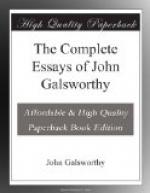He answered bravely: “No—I do not—I cannot say that in fact it is always so.”
“Is not then their teaching born of forms, and not of the spirit?”
He rose; and with a sort of deep sorrow at my stubbornness said: “We are not permitted to know the way of this; it is so ordained; we must have faith.”
As he stood there, turned from me, with his hat off, and his neck painfully flushed under the sharp outcurve of his dark head, a feeling of pity surged up in me, as if I had taken an unfair advantage.
“Reason—coherence—philosophy,” he said suddenly. “You don’t understand. All that is nothing to me—nothing—nothing!” 1911
WIND IN THE ROCKS
Though dew-dark when we set forth, there was stealing into the frozen air an invisible white host of the wan-winged light—born beyond the mountains, and already, like a drift of doves, harbouring grey-white high up on the snowy skycaves of Monte Cristallo; and within us, tramping over the valley meadows, was the incredible elation of those who set out before the sun has risen; every minute of the precious day before us—we had not lost one!
At the mouth of that enchanted chine, across which for a million years the howdahed rock elephant has marched, but never yet passed from sight, we crossed the stream, and among the trees began our ascent. Very far away the first cowbells chimed; and, over the dark heights, we saw the thin, sinking moon, looking like the white horns of some devotional beast watching and waiting up there for the god of light. That god came slowly, stalking across far over our heads from top to top; then, of a sudden, his flame-white form was seen standing in a gap of the valley walls; the trees flung themselves along the ground before him, and censers of pine gum began swinging in the dark aisles, releasing their perfumed steam. Throughout these happy ravines where no man lives, he shows himself naked and unashamed, the colour of pale honey; on his golden hair such shining as one has not elsewhere seen; his eyes like old wine on fire. And already he had swept his hand across the invisible strings, for there had arisen, the music of uncurling leaves and flitting things.
A legend runs, that, driven from land to land by Christians, Apollo hid himself in Lower Austria, but those who ever they saw him there in the thirteenth century were wrong; it was to these enchanted chines, frequented only by the mountain shepherds, that he certainly came.
And as we were lying on the grass, of the first alp, with the star gentians—those fallen drops of the sky—and the burnt-brown dandelions, and scattered shrubs of alpen-rose round us, we were visited by one of these very shepherds, passing with his flock—the fiercest-looking man who ever, spoke in a gentle voice; six feet high, with an orange cloak, bare knees; burnt as the very dandelions, a beard blacker than black, and eyes more glorious than if sun and night had dived and were lying imprisoned in their depths. He spoke in an unknown tongue, and could certainly not understand any word of ours; but he smelled of the good earth, and only through interminable watches under sun and stars could so great a gentleman have been perfected.




